Your search “Keep%20ethe%20eDeath%20ePenalty%abolished%20ein%20ethe%20ePhilippfines%20e%20e%20e%20e%20e%20e%20e%20e%20e%20e/page/www.deathpenalty.org/downloads/RadeletDeterrenceStudy20e09.pdf ”
Document(s)
Framing Death Penalty Politics in Malaysia
By Thaatchaayini Kananatu, on 1 September 2022
2022
Academic report
Malaysia
More details See the document
The death penalty in Malaysia is a British colonial legacy that has undergone significant scrutiny in recent times. While the Malaysian Federal Constitution 1957 provides that ‘no person shall be deprived of his life or personal liberty save in accordance with law’, there are several criminal offences (including drug-related crimes) that impose the mandatory and discretionary death penalty. Using Benford and Snow’s framing processes, this paper reviews death penalty politics in Malaysia by analysing the rhetoric of abolitionists and retentionists. The abolitionists, comprising activist lawyers and non-government organisations, tend to use ‘human rights’ and ‘injustice’ frames, which humanise the ‘criminal’ and gain international support. The retentionists, such as victims’ families, use a ‘victims’ justice’ frame emphasising the ‘inhuman’ nature of violent crimes. In addition, the retentionist state shifts between ‘national security’ and ‘national development’ frames. This paper finds that death penalty politics in Malaysia is predominantly a politics of framing.
This article was first published in Crime Justice Journal: https://www.crimejusticejournal.com/issue/view/119
- Document type Academic report
- Countries list Malaysia
Document(s)
‘Upholding the Cause of Civilization’: The Australian Death Penalty in War and Colonialism
By Mark Finnane, on 1 September 2022
Academic report
Australia
More details See the document
The abolition of the death penalty in Queensland in 1922 was the first in Australian jurisdictions, and the first in the British Empire. However, the legacy of the Queensland death penalty lingered in Australian colonial territories. This article considers a variety of practices in which the death penalty was addressed by Australian decision-makers during the first half of the 20th century. These include the exemption of Australian soldiers from execution in World War I, use of the death penalty in colonial Papua and the Mandate Territory of New Guinea, hanging as a weapon of war in the colonial territories, and the retrieval of the death penalty for the punishment of war crimes. In these histories, we see not only that the Queensland death penalty lived on in other contexts but also that ideological and political preferences for abolition remained vulnerable to the sway of other historical forces of war and security.
This article was first pubished in Crime Justice Journal: https://www.crimejusticejournal.com/issue/view/119
- Document type Academic report
- Countries list Australia
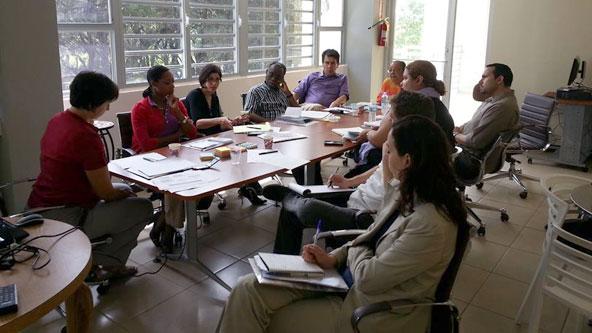
Article(s)
Caribbean network fleshes out plans for abolition
By Emile Carreau, on 16 January 2014
The Executive Committee of the Greater Caribbean for Life (GCL) network, constituted in October 2013, met in San Juan, Puerto Rico on January 11 and 12 to devise strategies to combat the death penalty in the region.
2014
Moratorium
Trinidad and Tobago

Article(s)
Call for tenders for the contracting of travel management services
By World Coalition Against the Death Penalty, on 15 June 2021
The World Coalition requires travel management services, on a non-exclusive basis, for World Coalition staff, members and partners.
2021
Article(s)
Video about the death penalty in the Palestinian Territories
By Federica Merenda, on 9 March 2016
Since the establishment of the Palestinian Authority, in 1994, 172 death sentences have been issued in the territories under its authority, of which 30 in the West Bank and 142 in the Gaza Strip, 87 since Hamas gained the control of the area in 2007. The video points out arguments against the death penalty: it is ineffective, irreversible, against human dignity and it has no deterrence effect as proved by the high criminal rate shared by the countries which use it most. Besides, while the Islamic Law regards it as a right of the relatives of the victim, the Shaaria also supports forgiveness and compensation.
2016
State of Palestine
Article(s)
Legal Officer – The Death Penalty Project
By The Death Penalty Project, on 23 January 2018
The Death Penalty Project recruits a Legal Officer.
2018
United Kingdom
Article(s)
8 Demands for Beijing
on 21 June 2007
By welcoming the Olympics in 2008, China committed itself to improving its human rights situation. Anxious to remind Chinese authorities of their commitments, nine French associations, five of which are members of the World Coalition, created the China 2008 Olympic Games Collective.
2007
China
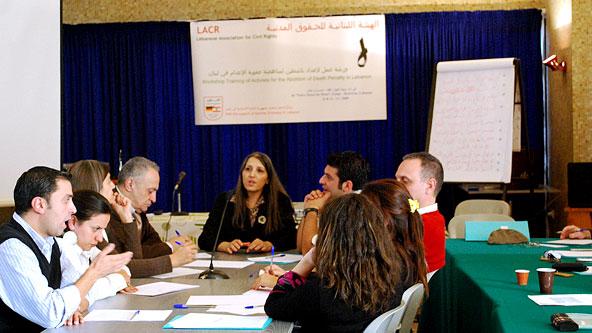
Article(s)
“Catastrophic” conditions on Lebanon’s death row
By Delphine Judith, on 31 May 2013
Ogarit Younan is a co-founder of the Lebanese Association for Civil Rights, which has just joined the World Coalition. She takes stock on the death penalty and abolitionist progress in Lebanon.
2013
Death Row Conditions
Lebanon
Article(s)
Évaluation finale externe d’un projet de 36 mois sur l’abolition de la peine de mort en Afrique
By FIACAT, on 13 March 2018
1. OrganisationLa Fédération internationale de l’Action des chrétiens pour l’abolition de la torture, la FIACAT, est une organisation internationale non gouvernementale de défense des droits de l’homme, créée en 1987, qui lutte pour l’abolition de la torture et de la peine de mort. La Fédération regroupe une trentaine d’associations nationales, les ACAT, présentes sur quatre […]
2018
cropped-favicon.png
on 26 April 2021
https://worldcoalition.org/wp-content/uploads/2021/04/cropped-favicon.png
2021
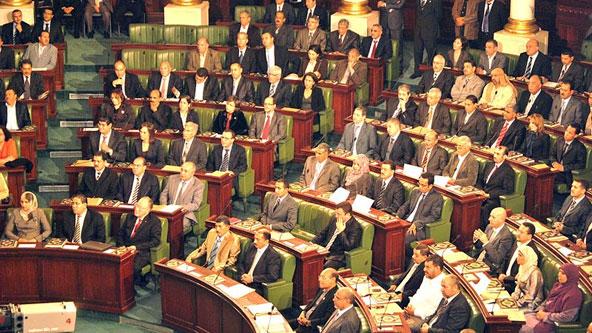
Article(s)
Tunisian Constitution enshrines right to life but upholds death penalty
By Delphine Judith, on 28 January 2014
After weeks of debates, Tunisia has adopted a new Constitution. As expected by local abolitionists, the National Constituent Assembly (NCA) passed a text allowing capital punishment on 26 January 2014.
2014
Moratorium
Tunisia
Article(s)
Training consultant
By World Coalition, on 21 January 2016
The World Coalition calls for applications for a consultant in charge of planning a training session in Sub-Saharan Africa.
2016
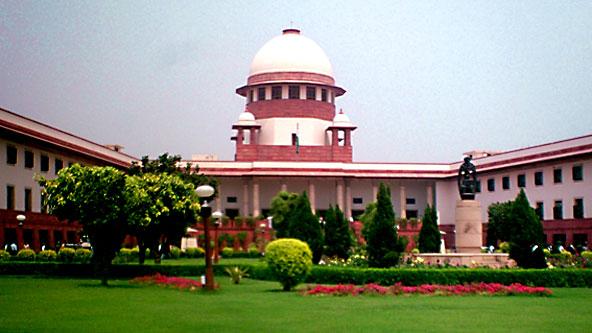
Article(s)
Indian ruling highlights importance of next World Day
By Emile Carreau, on 3 February 2014
On 21 January, India’s Supreme Court formally banned the execution of mentally ill prisoners and in doing so highlighted why this year’s World Day against the Death Penalty, which is dedicated to issues of mental health, is so important.
2014
India
Intellectual Disability
Mental Illness
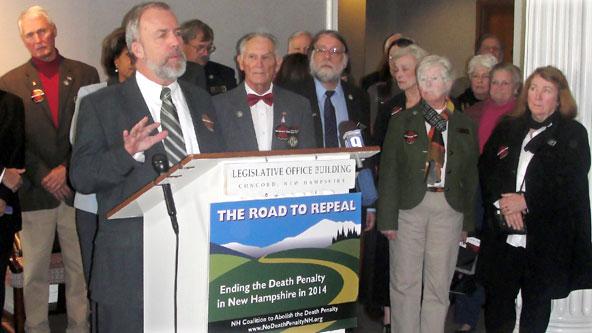
Article(s)
New conservative voices crucial in New Hampshire repeal campaign
By Thomas Hubert, on 26 February 2014
After a House committee passed a bill abolishing capital punishment on 11 February, State representative Renny Cushing explains the next steps as the World Coalition’s Steering Committee prepares to meet in New Hampshire in April.
2014
United States

Article(s)
Working with journalists to expose the death penalty’s flaws
By World Coalition Against the Death Penalty, on 30 June 2014
Journalists and activists held a joint practical workshop during the World Coalition’s recent AGM in Puerto Rico to discuss ways of getting the abolitionist message across in the media.
2014
Public Opinion
Puerto Rico
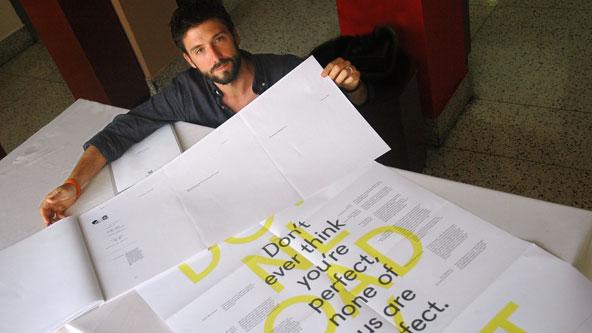
Article(s)
Publishing the final words of the executed to restore their humanity
By Thomas Hubert, on 16 October 2014
Publisher Joshua Herman and photographer Marc Asnin want to issue thousands of American schools with a book presenting the final statements of executed prisoners in an attempt to remind supporters and opponents of the death penalty alike that it targets human beings.
2014
Public Opinion
United States
Article(s)
African Great Lakes Coalition gets stronger
on 6 November 2009
The group, which brings together more than 30 member organisations from four countries, established itself as a formal body and launched its website on World Day Against the Death Penalty.
2009
Burundi
Democratic Republic of the Congo
Juveniles
Rwanda
Uganda
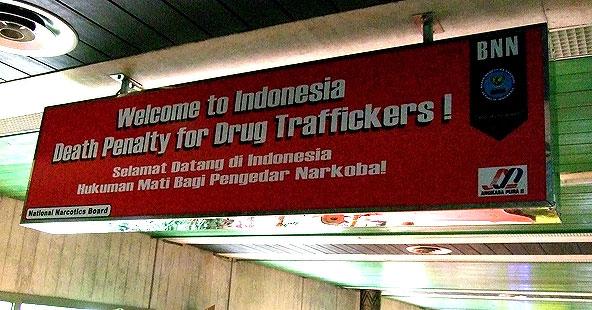
Article(s)
Indonesian executions on the rise as election looms
By Emile Carreau, on 10 December 2013
Executions have multiplied in Indonesia throughout 2013. World Coalition local member organization KontraS sees political motivations behind the end of a four-year moratorium.
2013
Indonesia
Indonesia
Article(s)
Iranian World Coalition member receives Martin Ennals award
on 23 May 2009
A group of prestigious human rights organisations have chosen to honour Emad Baghi, the founder of the Association for the Right to Live.
2009
Iran (Islamic Republic of)
Article(s)
Small Grant for Activities in the Caribbean
By World Coalition Against the Death Penalty, on 29 August 2019
Call for action on the abolition of the death penalty in Barbados and the Eastern Caribbean States launched by the Greater Caribbean for Life and the World Coalition Against the Death Penalty
2019
Barbados
Article(s)
Interview: Pakistan on its way to a moratorium?
on 25 July 2008
Pakistan’s new government has called on all death sentences in the country to be commuted to life imprisonment. Pakistani lawyer and human rights defender Kamran Arif believes a moratorium is at hand.
2008
Clemency
Moratorium
Pakistan
Pakistan
Article(s)
Program Officer
By PGA, on 22 February 2016
PGA is recruiting a Programme Officer for its Hague office.
2016
Article(s)
Program Manager
By World Coalition Against the Death Penalty, on 15 October 2018
The World Coalition Against the Death Penalty recruits a program manager for a full time permanent position starting in January 2019.
2018
Article(s)
Project officer – The Death Penalty Project
By The Death Penalty Project, on 23 January 2018
The Death Penalty Project is recruiting a Project Officer.
2018
United Kingdom
Article(s)
Finance and Administration Manager
By World Coalition Against the Death Penalty, on 14 May 2020
The World Coalition Against the Death Penalty recruits a Finance and Administration Manager for a full time permanent position starting as soon as possible.
2020

Article(s)
Abolition of the death penalty for terrorism in Chad
By FIACAT, on 30 April 2020
On 28 April 2020, the Chadian National Assembly unanimously voted to abolish the death penalty for crimes of terrorism.
2020
Chad
Article(s)
Logistics and Partnership Manager
By World Coalition Against the Death Penalty, on 3 February 2020
The World Coalition Against the Death Penalty recruits a logistics and partnership manager for a full time permanent position starting as soon as possible.
2020
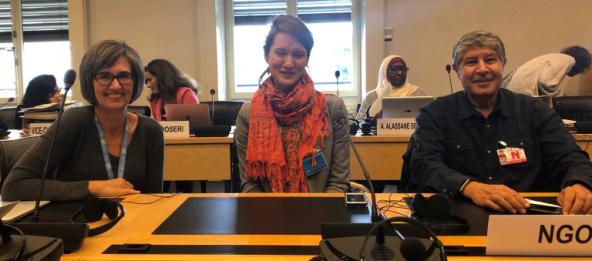
Article(s)
The Rights of Children Whose Parents Are Sentenced to Death – The Case of Tunisia
By Lisa Borden, volunteer with The Advocates for Human Rights, on 30 October 2019
I joined Bronwyn Dudley of the World Coalition Against the Death Penalty, and Choukri Latif of the Coalition tunissiene contre la peine de mort (a Tunisian anti-death penalty NGO), to address the committee regarding Tunisia’s failure to implement the rights of children whose parents have been sentenced to death or were executed.
2019
Juveniles
Tunisia
Article(s)
Call for tenders for printing, design and layout services
By Carlos Valera, on 7 July 2020
The World Coalition requires contracts for printing, design and layout services, visibility items and reprography for any publications that may be required, in addition to materials that may be required with these features.
2020
Article(s)
Website Redesign and Development
By World Coalition Against the Death Penalty, on 15 January 2020
The World Coalition Against the Death Penalty’s office in Paris area, France, is currently calling for web development and makeover tenders.
The objective is to award a contract to develop and maintain the World Coalition Against the Death Penalty’s new website, based on technical specifications.
2020
Trans Rights and Death Penalty Factsheet_V1.0
on 30 June 2021
2021
DroitsHumainsTrans_PDM_v1.1
on 30 June 2021
EN_WCADP_TDR_GenderSensitiveEvaluationWorldDay2021_30.09
on 7 October 2022
Terms of Reference – Gender sensitive Evaluation
2022
TESTIMONIALS FROM WOMEN SENTENCED TO DEATH
on 1 July 2021
2021
FR-WCADP-Programme2021GA
on 15 June 2021
2021
Advisory on the Increased Vulnerabilty of Women Migrant Workers on Death Row
on 3 December 2021
2021
Call Tender Travels
on 15 June 2021
2021
EN_WCADP_2020ActivityReport
on 9 September 2021
2021
Call Tender Evaluation 2021
on 15 June 2021
2021
FR_WCADP_TDR_GenderSensitiveEvaluationWorldDay2021_30.09
on 7 October 2022
Termes de reference – evaluation sensible au genre
2022
JM2020_RAPPORT_FR_SANS_ANNEXE-v1.0
on 9 June 2021
2021
2020 WORLD DAY REPORT NO ANNEX
on 9 June 2021
Article(s)
“We go to the prisoner’s village to question the witnesses”
on 28 February 2010
Caroline Muchuma, contributor to the round table on the vital role played by lawyers in defending those sentenced to death, describing her role as a lawyer and campaigner in Uganda.
2010
Legal Representation
Uganda
FACTS AND FIGURES 2020/2021
on 30 June 2021
2021
Program of the 18 June 2021 General Assembly
on 15 June 2021
2021
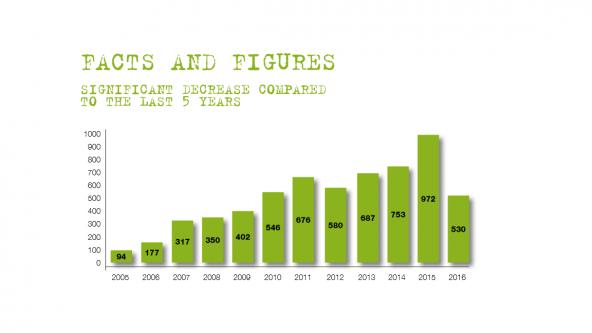
Article(s)
Iran: 2016 a deadly year despite a slight decrease in the executions
By Iran Human Rights, on 6 April 2017
The 9th annual report by Iran Human Rights (IHR)and ECPM (Ensemble contre la peine de mort) on the death penalty in Iran shows that in 2016 at least 530 people were executed in the Islamic Republic of Iran. Although this number is significantly lower than the annual execution numbers from the past five years, Iran remained the country with the highest number of executions per capita.
2017
Iran (Islamic Republic of)
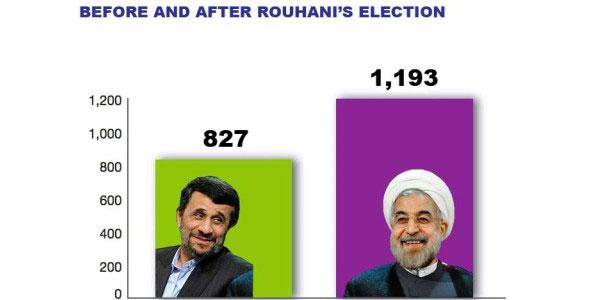
Article(s)
At least 1,193 executions since Hassan Rouhani’s election as president in Iran
on 13 March 2015
The annual report on the death penalty in 2014 shows that the Iranian authorities have executed more than 1193 people since the election of President Rouhani in June 2013. This is an average of more than two executions every day.
2015
Iran (Islamic Republic of)
N2245271
on 12 October 2022
2022
Testimonies2021_v1.0_FR
on 1 July 2021
2021
Detailed Factsheet: Women and the Death Penalty
on 1 July 2021
FRLetterIACHR
on 14 October 2020
2020
ESLetterIACHR
on 14 October 2020
ENLetterIACHR
on 14 October 2020
FRLetterIACHR
on 14 October 2020
WCADP_Bylaws_EN
on 10 November 2020
2020
Mobilization Kit World Day 2021 – EN
on 9 June 2021
2021
WD2020_MobilizationKit_AR
on 10 September 2020
2020
Poster EN World Day Against the Death Penalty 2021
on 9 June 2021
2021
WD2021_Kit_de_mobilisation_FR
on 9 June 2021
ISSUES AND RECOMMENDATIONS TO RAISE WITH THE GOVERNMENT OF MALAWI
on 27 May 2021
2021
Document(s)
The Death Penalty for Drug Crimes in Asia
By World Coalition Against the Death Penalty / Fédération Internationale des Ligues des Droits de l'Homme (FIDH), on 1 January 2015
2015
NGO report
More details See the document
The report, published for the 13th World Day against the Death Penalty, analyzes how the death penalty is applied for drug-related crimes in Asia, evaluates the most common arguments used by governments to justify their use of this inhumane and illegal measure, and exposes why these arguments are unjustified. Asia is the continent that executes the most people for drug-related crimes. However, the death penalty has not proven to be effective in reducing drug crimes in Asia.
- Document type NGO report
- Themes list Drug Offences, Country/Regional profiles,
Document(s)
Women and the Death Penalty in Iran
By Iran Human Rights, on 8 October 2021
2021
NGO report
Iran (Islamic Republic of)
Women
More details See the document
In observation of the 2021 World Day Against the Death Penalty dedicated to women, Iran Human Rights is providing a report on the women executed in Iran over the last 12 years (2010-2021). The executions in this period are by no means representative of the Islamic Republic of Iran’s complete history of executing women; the number of female political prisoners executed in the 1980s must be acknowledged due to their sheer volume and abhorrent nature. But even today, there is ample evidence of their cruel and inhuman treatment of female prisoners, which will be highlighted in this report.
- Document type NGO report
- Countries list Iran (Islamic Republic of)
- Themes list Women

Member(s)
International Federation of ACATs (FIACAT)
on 30 April 2020
The International Federation of ACATs (Action by Christians for the Abolition of Torture), FIACAT, is an international non-governmental human rights organisation, set up in 1987, which works towards the abolition of torture and the death penalty. The Federation brings together some thirty national associations, the ACATs, present in four continents. FIACAT – representing its members […]
2020
France

Member(s)
Chaml (Non-Violent Non-Sectarian Lebanese Citizenly Youth)
on 30 April 2020
Mandate and goals : Spread the culture of non-violence, non-sectarianism and human rights and advocate for political/legal change that is relevant to our values. We have five principles: Non-sectarianism, Non-violence, Justice, Democracy, and Sovereignty. Kind of actions : – Raise awareness, protest, and lobby to pass the Lebanese Personal Status law – Document sectarian hate […]
Lebanon

Member(s)
Abdorrahman Boroumand Center for the Promotion of Human Rights and Democracy in Iran
on 30 April 2020
Abdorrahman Boroumand Center previously know as Abdorrahman Boroumand Foundation Mandate and goals : Promoting universal human rights in Iran and documenting the violation of the right to life in the Islamic Republic of Iran Kind of actions : Creation of an online memorial to the victims of the violation of the right to life in […]
Iran (Islamic Republic of)

Member(s)
American Friends Service Committee
on 30 April 2020
The American Friends Service Committee (AFSC) carries out service, development, social justice and peace programs throughout the world. It was founded by Quakers during World War 1 to provide conscientious objectors with an opportunity to aid civilian war victims. The AFSC’s work is based on the Quaker belief in the worth of every person, and […]
United States
Document(s)
Leaflet LGBTQIA+ people and the Death Penalty
By World coalition against the death penalty, on 2 October 2023
2023
World Coalition
Gender
frMore details Download [ pdf - 861 Ko ]
- Document type World Coalition
- Themes list Gender
- Available languages Brochure personnes LGBTQIA+ et peine de mort
Document(s)
Leaflet Women and the Death Penalty
By World coalition against the death penalty, on 2 October 2023
World Coalition
Gender
frMore details Download [ pdf - 1448 Ko ]
- Document type World Coalition
- Themes list Gender
- Available languages Brochure femme et peine de mort
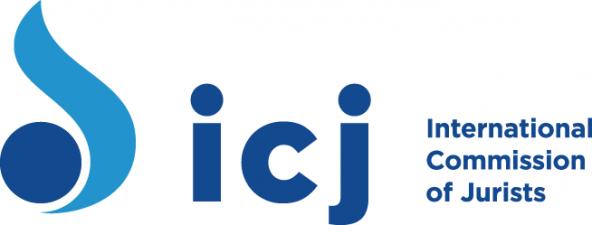
Member(s)
International Commission of Jurists
on 30 April 2020
The International Commission of Jurists (ICJ) is dedicated to promoting rule of law and advancement of human rights around the world. The ICJ statute provides: The Commission carries out activities at the global, regional, national and local level and in particular takes effective steps to: 1. Support and advance the Rule of Law and human […]
2020
Switzerland
Document(s)
The Death Penalty in 2010: Year End Reports
By Death Penalty Information Center, on 1 January 2010
2010
NGO report
More details See the document
The death penalty continued to be mired in conflict in 2010, as states grappled with an ongoing controversy over lethal injections, the high cost of capital punishment, and increasing public sentiment in favor of alternative sentences. Executions dropped by 12% compared with 2009, and by more than 50% since 1999. The number of new death sentences was about the same as in 2009, the lowest number in 34 years. —– For other DPIC year end reports (from 1995 – 2009) please visit: http://www.deathpenaltyinfo.org/reports
- Document type NGO report
- Themes list Trend Towards Abolition,
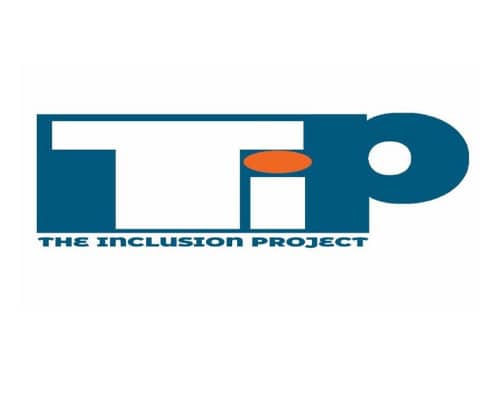
Member(s)
The Inclusion Project
on 13 September 2024
The Inclusion Project (TIP) is a legal services provider founded in 2019 and registered in Nigeria as The Inclusion Project.
2024
Nigeria
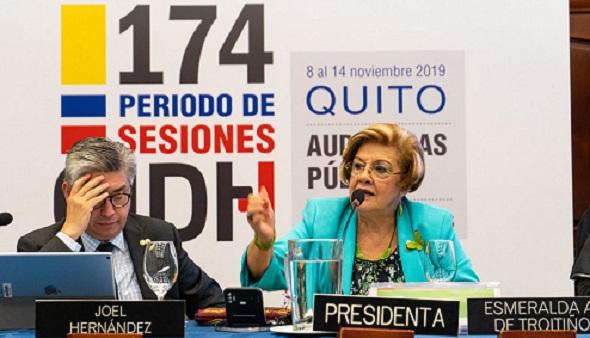
Article(s)
The Inter-American system commits to see the end of the death penalty
By World Coalition Against the Death Penalty, on 13 January 2020
In November 2019, Ecuador hosted a series of high level meetings of the Organisation of American States (OAS), including the Third Forum of the Inter-American Human Rights System and the 174th Period of Sessions of the Inter-American Commission on Human Rights (IACHR), during which abolition of the death penalty was on the agenda.
2020
Article(s)
Human Rights Advocacy Officer
By Harm Reduction International, on 17 August 2017
Harm Reduction International is currently seeking to recruit Human Rights Advocacy Officer. Working as a member of the Campaigns and Advocacy Team.
2017
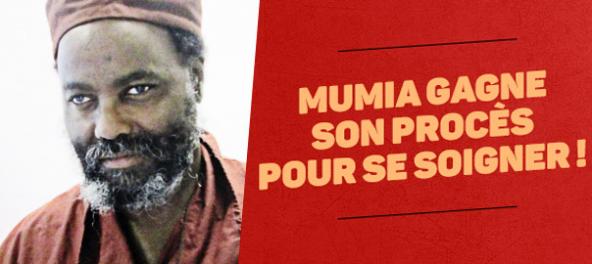
Article(s)
Federal Justice orders the prison administration to immediately provide African-American journalist Mumia Abu-Jamal with treatment
By French Collective "Free Mumia", on 18 January 2017
On the 3rd January of this year, a Federal judge ordered Pennsylvania’s prison administration to immediately provide Mumia Abu-Jamal with medication to treat his hepatitis C infection, justifying his decision in these terms: “budgetary constraints cannot outweigh the Eighth Amendment’s constitutional guarantee of adequate medical care.”
2017
Cruel, Inhuman and Degrading Treatment and Punishment
United States

Article(s)
Indonesia: execution for drug crimes is no solution
By World Coalition Against the Death Penalty, on 26 January 2015
In an open letter, the World Coalition and its members, including KONTRAS and Amnesty International, condemn the Indonesian government’s politicizing of the death penalty to show its commitment to eradicating drug-related crimes. Recent resumptions of executions show one thing, they are carried out for political reasons only: in Pakistan to show that it is tough on terrorism, Jordan that it tough on crime and Indonesia that it is tough on drugs. Instead, those states should abolish the death penalty to show their commitment to upholding human rights. The next World Day against the Death Penalty will be dedicated to the issue of capital drug crimes.
2015
Drug Offenses
Indonesia
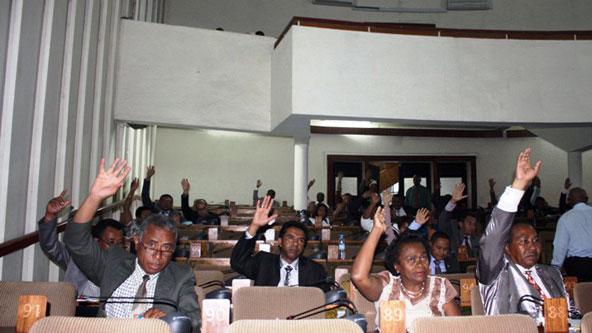
Article(s)
Madagascar’s MPs abolish the death penalty
on 10 December 2014
The National Assembly of Madagascar adopted a bill that abolishes the death penalty on 10 December, World Human Rights Day.
2014
Madagascar
Madagascar
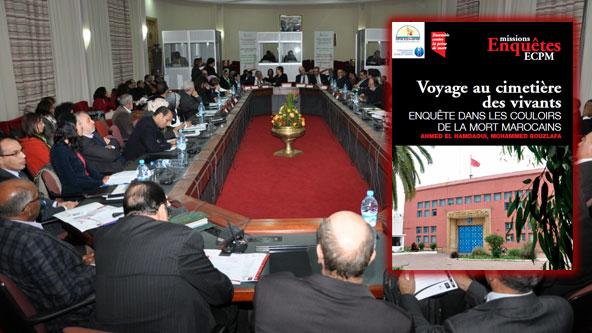
Article(s)
Abolitionist movement shifts up a gear in Morocco
By Thomas Hubert, on 20 December 2013
Through engagement with members of Parliament, the publication of an unprecedented report on death row conditions and the launch of a new website, the Moroccan abolitionist movement is entering a new dimension.
2013
Mental Illness
Morocco

Article(s)
Ten films to expose innocence on death row
By Laura Shacham - One for Ten, on 29 April 2013
One For Ten is a series of short documentary films telling the stories of innocent people who were on death row in the United States, with support from the World Coalition and several of its members.
2013
Innocence
United States
Document(s)
Bloodshed and Lies: Mohammed bin Salman’s Kingdom of Executions
By Reprieve UK and European Saudi Organization for Human Rights, on 31 January 2023
2023
NGO report
Saudi Arabia
arMore details See the document
Saudi Arabia is a flagrant abuser of the right to life. Between 2010 and 2021, Saudi Arabia executed at least 1243 people, making it one of the most rampant executioners in the world. As of December 2022, the Saudi regime had executed at least a further 147 people in 2022, including 81 people in one day in a mass execution on 12 March 2022.
Saudi Arabia’s use of the death penalty has drastically increased since 2015. This escalation has taken place on the watch of Saudi Arabia’s King Salman, who acceded the throne on 23 January 2015, and his son, Crown Prince and Prime Minister Mohammed bin Salman. The annual rate of executions has almost doubled since King Salman and Mohammed bin Salman came to power in 2015. From 2010-2014 there was an average of 70.8 executions per year. From 2015-2022 there was an average of 129.5 executions per year – a rise of 82%. The six bloodiest years of executions in Saudi Arabia’s recent history have all occurred under the leadership of Mohammed bin Salman and King Salman (2015, 2016, 2017, 2018, 2019 and 2022).
- Document type NGO report
- Countries list Saudi Arabia
- Available languages سفك الدماء والأكاذيب: مملكة إعدام محمد بن سلمان

Member(s)
Serbia Against Capital Punishment (SACP)
on 30 April 2020
Serbia Against Capital Punishment (SACP) was formed in 2012 to work towards universal abolition of the death penalty and to oppose its reintroduction in Serbia or any other country. It also opposes torture, as well as all other inhuman and degrading punishments. SACP maintains a data base of more than 7.000 persons sentenced to death […]
2020
Serbia
Document(s)
Safeguards guaranteeing protection of the rights of those facing the death penalty
By United Nations, on 1 January 1984
1984
United Nations report
arrufrzh-hantesMore details See the document
Approved by Economic and Social Council resolution 1984/50 of 25 May 19841. In countries which have not abolished the death penalty, capital punishment may be imposed only for the most serious crimes, it being understood that their scope should not go beyond intentional crimes with lethal or other extremely grave consequences.
- Document type United Nations report
- Themes list Fair Trial, International law, Most Serious Crimes,
- Available languages الضمانات التي تكفل حماية حقوق الذين يواجهون عقوبة الإعدامМеры, гарантирующие защиту прав тех, кому грозит смертная казньGaranties pour la protection des droits des personnes passibles de la peine de mort关于保护面对死刑的人的 权利的保障措施Salvaguardias para garantizar la protección de los derechos de los condenados a la pena de muerte
Document(s)
Report on the Death Penalty in Iraq UNAMI/OHCHR
By Office of the High Commissioner for Human Rights (OHCHR) / United Nations Assistance Mission for Iraq (UNAMI) Human Rights Office, on 1 January 2014
2014
International law - United Nations
More details See the document
This reporton the death penalty in Iraqis publishedjointlyby the Human RightsOffice of theUnited Nations Assistance Mission for Iraq (UNAMI)andthe Office of the United Nations HighCommissioner for Human Rights (OHCHR).The first section of this report outlines the international human rights standards on the use of thedeath penalty. The subsequent sections examine the domestic legal framework for the use of thedeath penalty in Iraq, judicial proceedings in death penalty cases, the implementation of the deathpenalty since 2004, and thejustifications put forward by the Government of Iraq for its continueduse. The report concludes with a set of recommendations tothe Iraqi authorities, the Governmentof Kurdistan Region and the international community.
- Document type International law - United Nations
- Themes list Due Process , Hanging, Country/Regional profiles,
Document(s)
Death Penalty: Sociological Survey of Public Opinion on the Abolition of the Death Penalty in the Republic of Tajikistan
By Penal Reform International, on 1 January 2013
2013
NGO report
More details See the document
The present study of public opinion on the death penalty in Tajikistan was conductedbetween June and August 2013. The main purpose of the study was to obtain reliableinformation about public opinion on the deathpenalty in Tajikistan, its awareness ofthe changes that have occurred in this areaand to see any changes in attitude since2010.
- Document type NGO report
- Themes list Public opinion,
Document(s)
Moving Away from the Death Penalty: Arguments, Trends, and Perspectives
By United Nations / Ivan Šimonovic, on 1 January 2014
2014
International law - United Nations
More details See the document
Why yet another book on the death penalty? The answer is simple: Aslong as the death penalty exists, there is a need for advocacy against it.This book provides arguments and analysis, reviews trends and sharesperspectives on moving away from the death penalty.
- Document type International law - United Nations
- Themes list Trend Towards Abolition,
Document(s)
Study on the question of the death penalty in Africa
By African Commission on Human and Peoples' Rights / Working Group on the Death Penalty in Africa, on 1 January 2011
2011
Book
frMore details See the document
The document broadly looks at the historical, human rights law, and practical aspects of the death penalty. It takes a comprehensive approach to the question of the death penalty, bearing in mind the need to provide the African Commission with sufficient information that will enable it to take an informed position on the matter.
- Document type Book
- Themes list International law, Country/Regional profiles,
- Available languages Etude sur la question de la peine de mort en afrique
Document(s)
The death penalty and the prohibition of torture and other cruel, inhuman or degrading treatment or punishment
on 21 August 2021
2021
NGO report
World Coalition
Cruel, Inhuman and Degrading Treatment and Punishment
frMore details See the document
The signatory organizations are convinced that the death penalty is incompatible with the prohibition of torture and cruel, inhuman or degrading treatment or punishment, which is a peremptory norm of international law (jus cogens) and should thus be abolished. The death penalty is only tolerated by international law and standards to the extent that it may only be imposed for the most serious crimes and applied in a way that causes the least possible suffering. However, the signatory organizations believe that from the sentencing to the execution, the death penalty inevitably causes physical harm and psychological suffering amounting to torture or ill-treatments.
The present position paper documents the extent to which international and regional organisation have already recognised a violation of the absolution prohibitionof torture in the application and imposition of the death penalty.
- Document type NGO report / World Coalition
- Themes list Cruel, Inhuman and Degrading Treatment and Punishment
- Available languages La peine de mort et l'interdiction de la torture et des peines ou traitements cruels, inhumains ou dégradants
Document(s)
Doomed to Repeat: The Legacy of Race in Tennessee’s Contemporary Death Penalty
By Death Penalty Information Center, on 16 June 2023
2023
NGO report
Fair Trial
United States
More details See the document
This report explores the current issues with capital punishment in Tennessee through a historical lens, tracing the origins of the use of the death penalty from lynchings and other forms of racial violence directed at Black Tennesseans. The stories of individuals and communities that have interacted with different facets of Tennessee’s justice system throughout history suggest that, in many ways, even though centuries have passed, the experiences of discrimination toward Tennessee’s communities of color continue. A meaningful understanding of the state’s history and its legacy of violence and racism is essential to avoid repeating the mistakes of the past.
- Document type NGO report
- Countries list United States
- Themes list Fair Trial
Document(s)
ISOLATION AND DESOLATION CONDITIONS OF DETENTION OF PEOPLE SENTENCED TO DEATH MALAYSIA – Bahasa Melayu
By Carole Berrih, Ngeow Chow Ying, ECPM, ADPAN, on 27 May 2021
2021
NGO report
Death Row Conditions
Malaysia
More details See the document
Isolation and Desolation – Conditions of Detention of People Sentenced to Death in Malaysia is the first ever fact-finding mission report on the conditions of detention of death row prisoners in Malaysia.
It examines the use of death penalty in Malaysia as well as the actual situation of people on death row.
This report is not meant to point fingers but rather to put the facts on the table in a transparent manner and work from there. It is mainly an advocacy tool for all abolitionist stakeholders, from civil society actors to the parliamentarians who will keep fighting for the abolition of the death penalty.
—————————————
Isolation and Desolation – Conditions of Detention of People Sentenced to Death di Malaysia adalah satu-satunya laporan berasaskan misi mengkaji fakta (fact-finding mission) mengenai keadaan-keadaan penahanan bagi banduan-banduan hukuman mati di Malaysia.
Laporan ini mengkaji pelaksanaan hukuman mati di Malaysia dan juga keadaan sebenar orang-orang yang dijatuhkan hukuman mati.
Laporan ini bukan bertujuan untuk menunding jari terhadap mana-mana pihak, tetapi bertujuan untuk memberi pencerahan kepada fakta-fakta yang ditemui dan berusaha ke atasnya. Laporan ini bertujuan utama sebagai alat advokasi kepada semua pihak yang mempunyai kepentingan dalam pemansuhan, bermula dari ahli persatuan kemasyarakatan sehingga ahli parlimen yang akan berusaha berterusan untuk memansuhkan hukuman mati.
- Document type NGO report
- Countries list Malaysia
- Themes list Death Row Conditions
Document(s)
Isolation and desolation conditions of detention of people sentenced to death Malaysia
By Carole Berrih, Ngeow Chow Ying, ECPM, ADPAN, on 27 May 2021
NGO report
Death Row Conditions
Malaysia
frMore details See the document
Isolation and Desolation – Conditions of Detention of People Sentenced to Death in Malaysia is the first ever fact-finding mission report on the conditions of detention of death row prisoners in Malaysia.
It examines the use of death penalty in Malaysia as well as the actual situation of people on death row.
This report is not meant to point fingers but rather to put the facts on the table in a transparent manner and work from there. It is mainly an advocacy tool for all abolitionist stakeholders, from civil society actors to the parliamentarians who will keep fighting for the abolition of the death penalty.
- Document type NGO report
- Countries list Malaysia
- Themes list Death Row Conditions
- Available languages Isolement et désespoir conditions de détention des condamnés à mort Malaisie
Document(s)
Death sentences and executions 2020
By Amnesty International , on 26 May 2021
2021
NGO report
aresfafrruMore details See the document
This report covers the judicial use of the death penalty for the period January to December 2020. As in previous years, information is collected from a variety of sources, including:
– official figures;
– judgements;
– information from individuals sentenced to death and their families and representatives;
– media reports;
– and, for a limited number of countries, other civil society organizations.
Amnesty International reports only on executions, death sentences and other aspects of the use of the death penalty, , such as commutations and exonerations, where there is reasonable confirmation. In many countries governments do not publish information on their use of the death penalty. In China and Viet Nam, data on the use of the death penalty is classified as a state secret. During 2020 little or no information was available on some countries – in particular Laos and North Korea (Democratic People’s Republic of Korea) – due to restrictive state practice.
- Document type NGO report
- Available languages أحكام وعمليات اإلعدام في2020CONDENAS A MUERTE Y EJECUCIONES 2020احکام مرگ و اعدامها۲۰۲۰سالCondamnations à mort et exécutions 2020ГЛОБАЛЬНЫЙ ДОКЛАД СМЕРТНЫЕ ПРИГОВОРЫ И КАЗНИ 2020
Document(s)
International Network of Academics Against the Death Penalty
By International Academic Network for the abolition of capital punishment, on 8 September 2020
2020
Working with...
More details See the document
It is of the utmost importance, in the short and medium-term, to develop an intense work of academically nature both of study and disclosure of the problems of the abolition of the death penalty in the international scenario, to complement and help the work of the diplomatic action and non-governmental organizations. To this effect it is proposed to keep REPECAP as an ever – growing scientific world network comprising academic law scholars, human rights centers, institutions of public law and Ngos, with expertise and skill in the problems of death penalty and interests in the field of international criminal justice, as well as young researchers who have been dealing with these topics or wish to get involved with the subject, regardless of nationality or locations.
- Document type Working with...
- Themes list Networks,
Document(s)
Add Resources and Apply Them Systemically: Governments’ Responsibilities Under the Revised ABA Capital Defense Representation Guidelines
By Eric M. Freedman / Hofstra Law Review, on 1 January 2003
2003
Article
United States
More details See the document
The mainstream legal community, including the ABA, has long understood the importance of system-building, but the revised Guidelines state the point especially forcefully. In articulating “the current consensus about what is required to provide effective defense representation in capital cases,” they set high performance standards not just for lawyers, but for death penalty jurisdictions. As the problems are systemic, it is “imperative” that the solutions be.The Guidelines accordingly not only call on governments to deliver capital defense resources that are sufficient in amount, but also furnish the states with a user-friendly blueprint for using those resources wisely to create structures that will function well in the present and evolve effectively over time. This mandate for institution-building is welcome, and the states should lead it. Indeed, they must do so if the Guidelines are to achieve their ameliorative purposes and avoid becoming just a collection of lofty aspirations “‘that palter with us in a double sense, that keep the word of promise to our ear, and break it to our hope”.
- Document type Article
- Countries list United States
- Themes list Legal Representation,
Document(s)
Deterrence and the Death Penalty Guide
By The Death Penalty Project, on 1 November 2022
2022
NGO report
Public Opinion
More details See the document
The most common justification for the retention of the death penalty among the minority of states that continue to sentence to death and execute individuals who are found guilty of committing certain serious offences is a belief that this punishment has a unique deterrent effect. The Death Penalty Project produced this resource on deterrence and the death penalty.
- Document type NGO report
- Themes list Public Opinion
Document(s)
Public Opinion and the Death Penalty Guide
By The Death Penalty Project, on 1 November 2022
NGO report
Public Opinion
More details See the document
When faced with calls to join the majority of states worldwide that have now abolished capital punishment, a key justification, typically relied upon by retentionist states, is that their citizens are not yet ready for abolition, and that political leaders must represent ‘the will of the people.’ The Death Penalty Project produced this resource on public opinion and the death penalty.
- Document type NGO report
- Themes list Public Opinion
Document(s)
European Court for Human Rights cases involving the death penalty
By European Court for Human Rights Press Unit, on 24 June 2022
2022
International law - Regional body
Regional body report
Cruel, Inhuman and Degrading Treatment and Punishment
Death Row Conditions
Fair Trial
More details See the document
“[T]he [European Court of Human Rights] in Öcalan did not exclude that Article 2 [of the European Convention on Human Rights, protecting the right to life,] had already been amended so as to remove the exception permitting the death penalty. Moreover, … the position has evolved since then. All but two of the Member States have now signed Protocol No. 13 [to the Convention, concerning the abolishment of the death penalty in all circumstances,] and all but three of the States which have signed have ratified it. These figures, together with consistent State practice in observing the moratorium on capital punishment, are strongly indicative that Article 2 has been amended so as to prohibit the death penalty in all circumstances. Against this background, the Court does not consider that the wording of the second sentence of Article 2 § 1 continues to act as a bar to its interpreting the words ‘inhuman or degrading treatment or punishment’ in Article 3 [of the Convention, prohibiting torture and inhuman or degrading treatment,] as including the death penalty …” (Al-Saadoon and Mufdhi v. the United Kingdom judgment of 2 March 2010, § 120).
- Document type International law - Regional body / Regional body report
- Themes list Cruel, Inhuman and Degrading Treatment and Punishment / Death Row Conditions / Fair Trial
Document(s)
The Mercy Workers, Death Penalty Mitigation Specialists
By Maurice Chammah, The Marshall Project, on 2 March 2023
2023
Article
Legal Representation
United States
More details See the document
For three decades, a little-known group of “mitigation specialists” has helped save death-penalty defendants in the USA by documenting their childhood traumas. A rare look inside one case.
- Document type Article
- Countries list United States
- Themes list Legal Representation
Document(s)
Anything But Humane
By Amnesty International - USA, on 8 September 2020
2020
Arguments against the death penalty
More details See the document
A fact sheet on the lethal injection in the United States. This page details the process of lethal injection with statements of US health professional associations on participation in execution.
- Document type Arguments against the death penalty
- Themes list Lethal Injection,
Document(s)
Legislators’ Opinions on the Death Penalty in Taiwan
on 24 March 2022
2022
NGO report
Public Opinion
Taiwan
zh-hantMore details See the document
In 2021, The Death Penalty Project and the Taiwan Alliance to End the Death Penalty (TAEDP) commissioned Professor Carolyn Hoyle at the University of Oxford and Professor Shiow-duan Hawang at Soochow University, Taipei to carry out a study exploring Taiwanese legislators’ attitudes towards capital punishment.
The study reveals that the majority of Taiwan’s legislators would like to see the death penalty abolished. The risk of wrongful convictions, the abuse of human rights and a recognition that the death penalty has no unique deterrent effect, were the primary reasons cited for supporting abolition. Additionally, a majority of legislators interviewed expressed fairly low levels of trust in the Taiwanese criminal justice system, with doubts raised over its ability to offer adequate safeguards to individuals facing capital trials.
Key findings:
– 61% of legislators interviewed are in favour of abolishing the death penalty
– 39% of legislators interviewed are in favour of retaining the death penalty, but only one legislator was strongly in favour
– 71% of retentionists and 65% of abolitionists asserted that wrongful convictions ‘sometimes’ occurred
– Only 11% of legislators interviewed thought that wrongful convictions ‘rarely’ occur
– All legislators interviewed expressed a preference for social justice measures, such as poverty reduction, over increased executions when asked to rank a range of policies aimed at reducing violent crime
- Document type NGO report
- Countries list Taiwan
- Themes list Public Opinion
- Available languages 台灣立法委員對死刑 之意見調查
Document(s)
Death penalty developments in 2005
By Amnesty International, on 1 January 2006
2006
NGO report
fresMore details See the document
This document covers significant events concerning the death penalty during the year 2005. Two countries abolished the death penalty for all crimes, bringing to 86 the number of totally abolitionist countries at year end. Moratoria or suspensions of executions were being observed in several countries. At least 2,148 people were executed in 22 countries, and at least 5,186 were sentenced to death in 53 countries. Eight child offenders were executed in Iran. Other sections include significant judicial decisions; the use of the death penalty against child offenders and resumptions of executions.
- Document type NGO report
- Themes list Statistics,
- Available languages La peine de mort dans le monde : évolution en 2005LA PENA DE MUERTE EN EL MUNDO: NOTICIAS DEL AÑO 2005
Document(s)
The death penalty wordwide: developments in 2004
By Amnesty International, on 1 January 2005
2005
NGO report
fresMore details See the document
This document covers significant events concerning the death penalty during the year 2004. Five countries abolished the death penalty for all crimes, bringing to 84 the number of totally abolitionist countries at year end. Scores of death sentences were commuted in Malawi and Zambia, and moratoria or suspensions of executions were being observed in several other countries. Other subjects covered in this document include significant judicial decisions; the use of the death penalty against the innocent; resumptions of executions; and campaigning activities to promote abolition.
- Document type NGO report
- Themes list Statistics,
- Available languages La peine de mort dans le monde: évolution en 2004La pena de muerte en el mundo: noticias del año 2004

